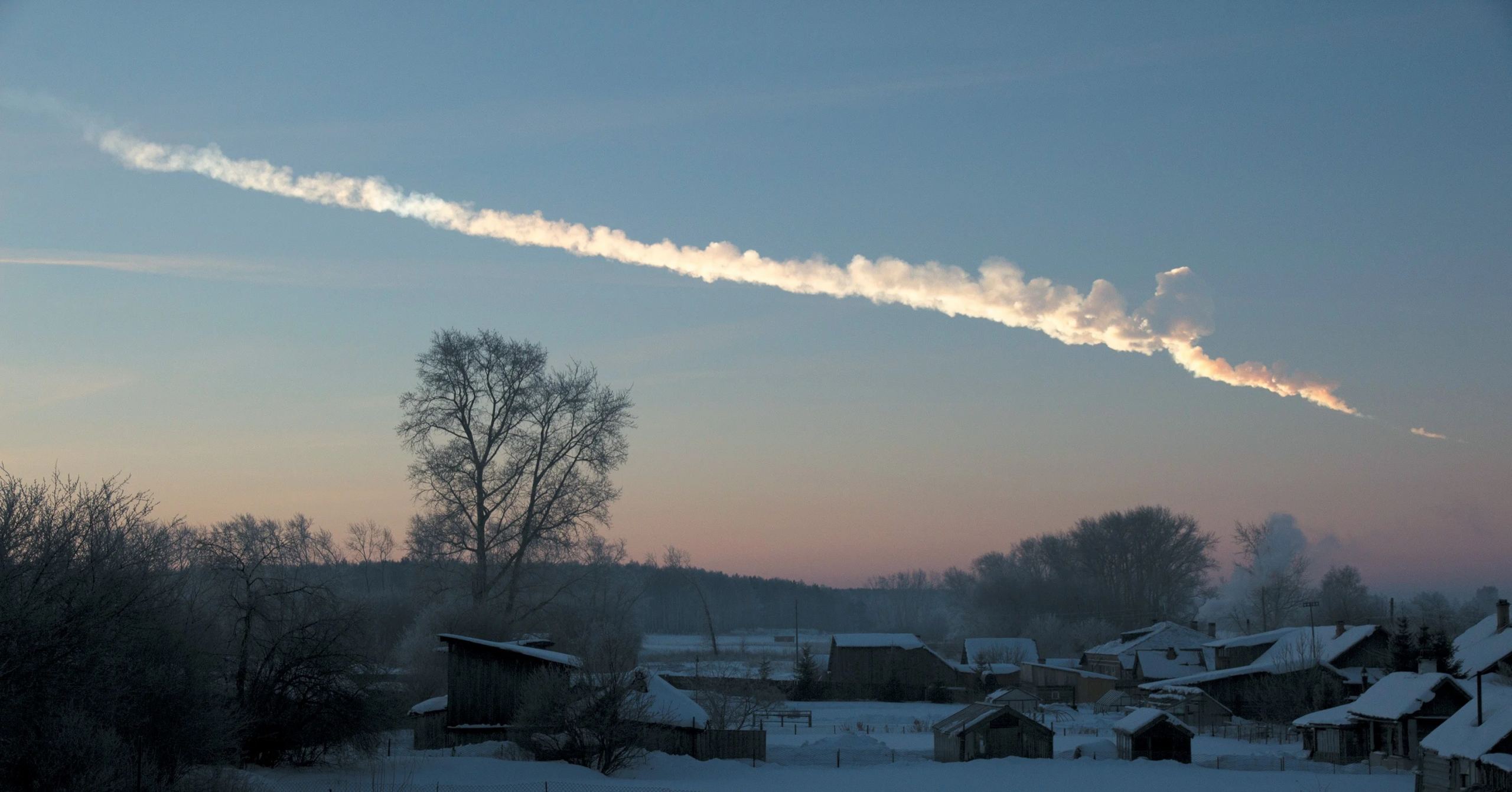

This vapor trail was left behind by an asteroid that zoomed over the Siberian city of Chelyabinsk in 2013. (Credit: Alex Alishevskikh via NASA)
Sending astronauts to the moon is OK — but more Americans think NASA should instead put a high priority on monitoring outer space for asteroids and other objects that could pose a threat to Earth, according to the Pew Research Center’s latest survey focusing on Americans’ perspectives on space policy.
The nonprofit research center’s report was released today, on the 54th anniversary of the Apollo 11 moon landing. It follows up on a similar survey that was done in 2018 to mark NASA’s 60th anniversary.
The earlier survey suggested that slightly more Americans saw monitoring climate change as a top priority (63% vs 62%). This year, the rankings were reversed, with 60% putting cosmic threats at the top of their list, as opposed to 50% for climate concerns. Only 12% of the respondents said sending astronauts to explore the moon was a top priority, and 11% said sending astronauts to Mars led their list. That translates into less support than those missions had five years ago.
The survey, conducted online from May 30 to June 4, is based on responses from 10,329 randomly selected U.S. adults who are part of the research center’s online panel. The results were weighted to reflect current demographics.


For what it’s worth, NASA is spending much more on its plan to send astronauts to the moon than on asteroid detection and monitoring: More than $5.4 billion is budgeted in the current fiscal year for the Artemis moon program, while $138 million is set aside for planetary defense.
Both those programs have had high-profile successes in the past year: The Artemis 1 mission sent an uncrewed Orion space capsule on a round-the-moon test flight, while the Double Asteroid Redirection Test, or DART, provided a wealth of data about the prospects for changing an asteroid’s path.
As has been the case in earlier surveys, NASA registered positive marks on the Pew Research Center’s latest report card. More than two-thirds of Republicans as well as Democrats said that the U.S. should be a world leader in space exploration. That’s in line with a Pew study released in March that suggested nearly three-quarters of Americans have a favorable view of NASA — as opposed to just 9 percent who had an unfavorable opinion.
The proponents of both political parties had similar views on most space priorities, but there were significant differences on climate policy. A higher proportion of Democrats tended to rate monitoring key parts of Earth’s climate system as a top priority (69%, vs. 30% for Republicans).
Over the past five years, America’s space effort has broadened to give bigger roles to commercial space ventures backed by billionaires: For example, Elon Musk’s SpaceX began flying NASA astronauts to the International Space Station in 2020. A year later, Virgin Galactic founder Richard Branson took a suborbital space ride on his company’s rocket plane, and Blue Origin sent founder Jeff Bezos on a suborbital space trip as well.
In the survey, more Americans said private space companies are doing a mostly good job — as opposed to a mostly bad job — when it comes to building safe and reliable spacecraft, making important contributions to space exploration and opening up space travel to more people. “Still, many are unsure how private companies are doing in these areas, reflecting limited familiarity with them,” the Pew Research Center said in a news release.
Fifty-five percent of the respondents said they expected space tourism to become routine in the next 50 years, although 65% said they wouldn’t personally be interested in taking a ride.
In the years ahead, people are likely to learn more about private space efforts through satellite networking projects such as SpaceX’s Starlink, which has launched more than 4,800 satellites into orbit since 2018. Starlink has attracted more than a million subscribers — and has generated debates over orbital traffic management and night-sky interference.
Private ventures got their worst grades on the issue of limiting the debris from rockets, satellites and other human-made objects in space. Just 27% of the Republicans in the survey said space companies were doing a mostly good job on space debris, and the figure fell to 16% among Democrats.
Even though commercial ventures are taking a bigger role in space, Americans still want NASA to play its part. In the newly released survey, 65% said that it’s essential for NASA to continue to be involved in space explorations, while 32% said that private companies would ensure that enough progress is made in space even if NASA isn’t involved.
Looking ahead, 69% of those surveyed think there will definitely or probably be a major problem with space debris over the next 50 years. Forty-four percent think the U.S. will definitely or probably fight against other nations in space sometime in the next 50 years. Forty percent think intelligent life will be discovered on another planet by 2073, and 34% think people will be building settlements on other planets by that time.
Check out the Pew Research Center’s full report for further details about the survey respondents’ attitudes toward America’s space effort, as well as details about how the survey was conducted.
Our Solar System is in motion and cruises at about 200 kilometres per second relative…
Late is better than never for the ‘Blaze Star’ T Coronae Borealis. It was on…
A planet's history is told in its ancient rock. Earth's oldest rocks are in the…
Data from the Chinese rover Zhurong is adding to the pile of evidence for oceans…
New information is pushing Asteroid 2024 YR4 off of our front pages. Initial estimates gave…
Magnetars are a type of neutron star with the most powerful magnetic fields in the…